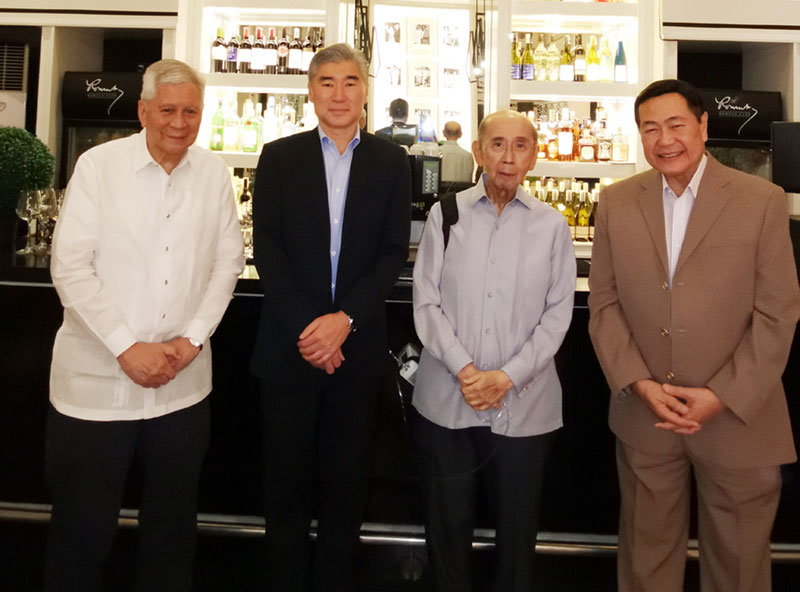Phl-US relations

Philippine-US relations have had its ups and downs over the years. This complicated relationship tests the mettle of the US Ambassador and thus deservedly has become an important post for an American diplomat on an upward trajectory. But there was nothing quite like the situation that Ambassador Sung Kim faced when he arrived at practically the same time that President Duterte began his term came in 2016. Our President has a personal distrust of the United States. As many recall, he cursed both president Obama and Kim’s predecessor. Duterte has long had a personal distrust of the United States dating back to his time as Davao City mayor so it does not take much to set him off. The future of our bilateral relations seemed bleak.
Now three years later, Ambassador Kim will be bidding his farewell, and to paraphrase Mark Twain, the reports of the demise of our relations with the US are greatly exaggerated. In fact, the relationship remains strong despite our government’s flirtation with our powerful neighbor to the North.
As a people, we respond to emotions and symbolisms and we have a leader who is highly personalistic. Ambassador Kim has shown his understanding of the FiIipino psyche and especially of their leader. Learning how to bite his tongue must have been his first lesson. Here are three of his accomplishments that stands out for the emotive response that they generated.
The first is the return of the three Balangiga bells. For President Duterte already smarting from American criticism for his drug war and refusing him a visa years ago, the Balangiga bells provided a historical context to his dislike for the United States. The return of the bells moved the President to proclaim that the return “heralds a new and more vibrant chapter in our bilateral relations.”
The second is the long sought-after clarification from the US as to whether the Mutual Defense Treaty (MDT) would apply to an armed attack on Filipino forces in the South China Sea (SCS). It was never clarified in uncertain terms that the SCS was part of the “Pacific” area until Secretary of State Mike Pompeo visited Manila in March 2019 and declared that the South China Sea is in the Pacific, and that any armed attack on Philippine armed forces, public vessels, or aircraft in the SCS will trigger a response under Article IV.

These kinds of actions appeal to the Filipino. Our bilateral relations have settled into a comfort zone taking into account the temperament of both leaders on top of the underlying strength of our relationship. Still, I cannot help but feel concerned about the timing of his departure. Whoever replaces Sung will have very big shoes to fill in keeping our relationship on an even keel.
He or she will come at a time when China has upped its aggressive action in the SCS while the US attention focuses on domestic political crisis triggered by the initiation of an impeachment inquiry of President Trump and the coming elections. It would be tempting for Duterte to lean more towards appeasing the country that is of immediate threat to his own.
Towards an independent foreign policy
These developments place the pursuit of an “independent” foreign policy even more crucial. President Duterte’s cultivation of personal relations with China’s Xi Jin Ping or Russia’s Vladimir Putin will not amount to “independent” if it does not result in the enhancement of the “national interest” which entails pursuing varied relationships that maximizes autonomy, security and prosperity. It does not mean substituting subservience from one power to another but rather maintaining a delicate balance. After all, when push comes to shove, one tends to trust those who share the same democratic values that we hold dear.
Nonetheless I think this – along with visits to Israel and the invigoration of our relationship with Japan - is a step forward in the President’s continuing education on foreign policy…..as well (hopefully) as future visits to the West. One that is driven by pragmatism and not as a response to a perceived slight. He sounds the part of a statesman when he reads prepared statements before an international audience. But is somewhat negated when he speaks off the cuff in response to questions or before a Filipino audience. Some things he must hold close to his chest and some he may utter by design to make a point.
Perhaps we can learn a lesson from Finland which has managed to prosper in the shadow of the Russian bear despite it being firmly on the Western camp. Malaysia’s Mahathir has also carved a win-win relations with China with a mixture of deference in his public utterances but principled stand on issues that matter such as the terms of a huge China financed infrastructure project.
- Latest
- Trending































